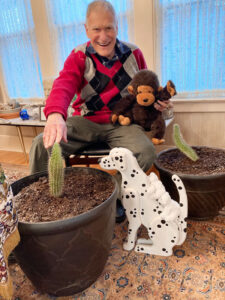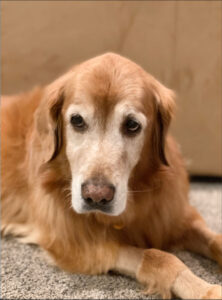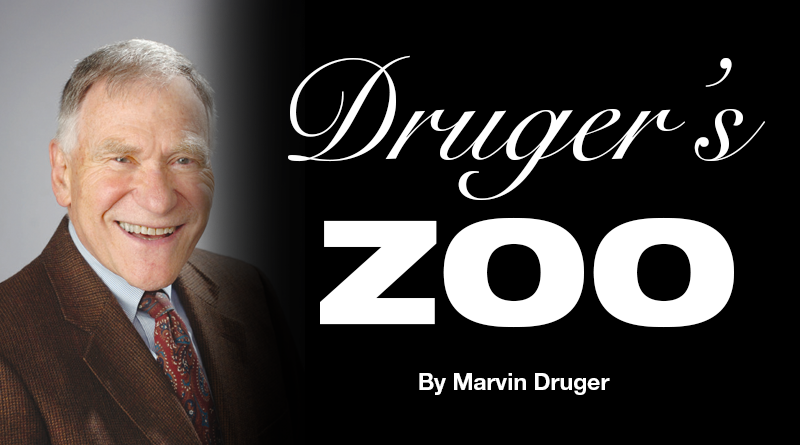It’s a Dog’s Life
Death of loved pet rattles emotions
By Marvin Druger and Victoria Bartling
Email: mdruger@syr.edu

I am not usually a pet lover and I have avoided having a live pet for many years. My aversion to pets dates back to my teenage days.
My family had a cocker spaniel named Topsy. She developed a cervical problem and required major surgery. My family had to choose between getting Topsy the risky surgery, or just letting her die from her ailment. If Topsy had the surgery, she might recover. If we decided not to allow the surgery, my mother would be overwhelmed with caring for a sick dog, since all of us were in school.
We decided that we had to give Topsy a chance to survive, and possibly recover. My family was too poor to own a car, so my two brothers and I called a taxi to take Topsy to the veterinarian for the surgery. My brother, Len, held Topsy in his arms and my other brother Steve and myself sat on either side of Len in the back of the taxi. As we progressed toward the veterinarian, Topsy died in Len’s arms. That was when I vowed never to own a dog. Usually, they die in your lifetime, and the loss is like losing a family member. The tragedy is too difficult to bear.
So, my pets over the years have been a wooden Dalmatian named Spot, a stuffed monkey named Bobo, and two saguaro cactus plants named Spike 1 and Spike 2. Spot has two small, furry dogs clinging to her back. The animal pets require no care or expense, and the saguaro cactus plants usually live for more than 150 years. So, the cactus plants will likely be mourning over me.
My companion, Victoria, has two dogs — Gracie and Linus. Gracie is a beautiful golden retriever with unlimited energy. Linus is a much smaller dog with a mind of its own.
If Gracie is left off leash, she hangs around us. If Linus is left off leash, he disappears and doesn’t return. We have had several hunts in the forests for Linus. Victoria obviously loves these dogs, and I have come to love them, too. I bring them treats and marrow bones and they show great affection toward me.
Everyone in my family now owns a dog as a pet. In fact, my daughter-in-law, Suzanne, has five dogs. My favorite dog has been Bailey, a golden retriever owned by my daughter.
But I have the best of all worlds. I can enjoy the affection and warmth of having a dog as a pet without owning one and having to care for it. Anyone with a dog as a pet knows how expensive and inconvenient they can be. I shiver when I think of Victoria having to walk her dogs in the freezing cold in winter after a late night out. I am free of that responsibility.
Fond farewell

This morning, my granddaughter contacted me on Facetime. She showed me Bailey, lying quietly on the floor. She told me that Bailey was dying. She was 13 years old and they were going to bring her to the vet today to terminate her life. I was devastated by the news. I have lost my parents, a dear wife and my brother Steve in my lifetime, and I had to tolerate the losses courageously. There was nothing that I could do about it. I felt hopeless and lost. Little did I realize that I would feel the same way about the passing of Bailey.
She was my good friend and companion and there was something precious about our relationship. Whenever I visited my daughter, Bailey would excitedly greet me. Without prompting, Bailey would put a paw on my knee, as if to show affection. Then, she would lie at my feet. I could feel the warm rapport between us. Now, she is gone, but will remain in my heart and mind.
Bobo and Spot are inanimate, so I don’t have to worry about losing them. But, I wonder how I would feel if Spike 1 and Spike 2 were gone? Would I mourn over the loss of my two saguaro cactus plants?
I empathize with readers who have a live pet, whether it be a dog, cat, snake, turtle or Mimosa pudica (the sensitive plant). We somehow come to accept the death of a human, but the death of a pet is, in some ways, even more tragic.
Maybe it’s because we know that humans will die and we are conscious of that inevitability, whereas pets don’t know that they too will die.
A friend jokingly told me, “If you want your children to learn about death, get them an aquarium with fish.”
Bailey lived a good life. She loved toys, Greenies, treats and people. She had a gentle temperament. She didn’t bark nor bite. She was a poor watchdog and probably would have greeted any house intruder with tail wagging and hand-licking.
In the late evening, she would go to her bed on the floor in the corner of the bedroom and go to sleep. To my surprise, I will miss her dearly. But, probably, my daughter will get a new puppy. The new dog will never be the same as Bailey, but it will be loved as Bailey was loved.
The tragic death of a pet reminds us of our own mortality. It’s sad, but true, that no matter how well we live our lives or how many good things we do, the grim reaper will be there at the end. So, each of us should try to live our own lives as fully as possible. There will be another pet to love, and life will go on. Goodbye, Bailey.
‘The tragic death of a pet reminds us of our own mortality. It’s sad, but true, that no matter how well we live our lives or how many good things we do, the grim reaper will be there at the end.’

